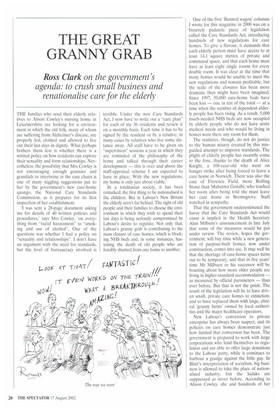THE GREAT GRANNY GRAB
Ross Clark on the government's agenda: to crush small business and renationalise care for the elderly
THE families who send their elderly relatives to Alison Cowley's nursing home in Leicestershire are looking for a environment in which the old folk, many of whom are suffering from Alzheimer's disease, are properly fed, clothed and allowed to live out their last days in dignity. What perhaps bothers them less is whether there is a written policy on how residents can explore their sexuality and form relationships. Nevertheless, the possibility that Mrs Cowley is not encouraging enough grannies and grandacis to intertwine in the easy chairs is one of many niggling suggestions put to her by the government's new care-home quango, the National Care Standards Commission, as it prepares for its first inspection of her establishment.
'I was sent a 28-page document asking me for details of 40 written policies and procedures,' says Mrs Cowley, 'on everything from "racial harassment" to "smoking and use of alcohol". One of the questions was whether I had a policy on "sexuality and relationships". I don't have an argument with the need for standards, but the level of bureaucracy involved is terrible. Under the new Care Standards Act, I now have to write out a "care plan" for each of my 36 residents and review it on a monthly basis. Each time it has to be signed by the resident or by a relative; in many cases by relatives who live some distance away. All staff have to be given six "supervision" sessions a year in which they are reminded of the philosophy of the home and talked through their career development — this is over and above the staff-appraisal scheme I am expected to have in place. With the new regulations, my home is only just about viable.'
In a totalitarian society, it has been remarked, the first thing to be nationalised is the children. But in Labour's New Britain the elderly aren't far behind. The right of old people and their families to choose the environment in which they wish to spend their last days is being seriously compromised by Labour's desire to regulate. Not only that; Labour's granny grab is contributing to the mass closure of care homes, which is blocking NHS beds and, in some instances, hastening the death of old people who are forcibly shunted from one home to another.
One of the first 'Banned wagon' columns I wrote for this magazine in 2000 was on a bizarrely pedantic piece of legislation called the Care Standards Act, introducing hundreds of new regulations for care homes. To give a flavour, it demands that each elderly person must have access to at least 14.1 square metres of private and communal space, and that each home must have at least eight single rooms for every double room. It was clear at the time that many homes would be unable to meet the new regulations and remain profitable, but the scale of the closures has been more dramatic than might have been imagined. Since 1997, 50,000 care-home beds have been lost — one in ten of the total — at a time when the number of dependent elderly people has been rising. As a result, 5,000 much-needed NHS beds are now occupied by elderly people who do not have acute medical needs and who would be living in homes were there any room for them.
The statistics, though, do not do justice to the human misery created by this misguided attempt to improve standards. The plight of elderly people has recently come to the fore, thanks to the death of Alice Knight, a 108-year-old who went on hunger strike after being forced to leave a care home in Norwich. There was also the case of Florence Field, more Rolling Stone than Mahatma Gandhi, who trashed her room after being told she must leave her care home in Bromsgrove. Staff watched in sympathy.
That the government underestimated the havoc that the Care Standards Act would cause is implicit in the Health Secretary Alan Milburn's announcement in late July that some of the measures would be put under review. The review, hopes the government, will buy time while a new generation of purpose-built homes, now under construction, comes into use. It may well be that the shortage of care-home spaces turns out to be temporary, and that in five years' time Mr Milburn or his successor will be boasting about how more older people are living in higher-standard accommodation — as measured by official parameters — than ever before. But that is not the point. The result of the legislation will be to have driven small, private care homes to extinction, and to have replaced them with large, clinical 'granny farms' owned by local authorities and the major healthcare operators.
New Labour's conversion to private enterprise has always been suspect, and its policies on care homes demonstrate just how limited that conversion has been. The government is prepared to work with large corporations who lend themselves to regulation and are able to offer large donations to the Labour party, while it continues to harbour a grudge against the little guy. In Blair's interpretation of socialism, big business is allowed to take the place of nationalised industry, but the kulaks are suppressed as never before. According to Alison Cowley, she and hundreds of her fellow care-home owners wrote to warn the government of the devastating effect that rules of standardised room-sizes would have — yet it was only when Bupa recently discovered that hundreds of doors in its homes are two centimetres too narrow to pass muster that Alan Milburn announced a review. Meanwhile, local authorities are forcing down the fees they pay for elderly social-security claimants to be looked after in small, private care homes to well below the true cost. While Birmingham City council pays residential homes only £255 per week for every resident placed there, it spends an average of £522 a week looking after old people in its own homes.
Numerous clauses of the Care Standards Act have been so well-tailored to put at a disadvantage the small rest home set in a Victorian villa on the south coast that one wonders whether the government bears a grudge against the crusty old colonels who lurk within. Attempting to impose standardised room sizes on such establishments is a nonsense: many are large, spacious buildings but are arranged so as to make it impossible to conform to the government's demands. 'I have one room which is slightly smaller than it should be,' says Jean Cowley (no relation of Alison), who runs a home created from two Victorian villas in King's Heath, Birmingham. 'But if I lose that one, then I have to lose a double room as well, because it would put me over the allowable ratio of one double room to eight singles. The rule against double rooms is particularly stupid because confused people often prefer to share a room. Many old people have never lived alone in their lives and can feel uncomfortable if on their own. On top of that, I have two married couples living in my home. It is quite possible in future that we will have to split up married couples just in order to conform with the rules.'
An even more unfair rule is that managers of care homes will in future be expected to have a qualification called NVQ4 — which is a social-work qualification of recent origin. The fact that Jean Cowley is a qualified nurse with a specialism in gerontology and has run a care home for 15 years counts for nothing in the government's eyes. While large organisations can afford to retrain staff, or, equally likely, sack the older nurses and replace them with newly trained social workers, the rule could prove ruinous to the likes of Jean Cowley. The same is true of the numerous written policies that care homes are now expected to produce. Such a move presents few problems for the large healthcare companies — they can compose one policy to cover dozens of homes; but for small, independent homes — the average residential home closed in recent months had only 15 residents — the writing of such policies is causing a huge administrative burden.
Nobody denies that there are some dodgy old people's homes around. One thinks of the one in Yorkshire forced to close a few years ago after it was caught trying to feed a dozen old people on a pie made from one small tin of pilchards. But there is scant evidence that old people are happier or healthier in the large, clinical homes which the government favours.
Lynde House, a spanking new care home set in leafy grounds by the Thames in Twickenham. is a perfect model for the type of establishment that the government is seeking to encourage. It is owned by Westminster Health Care, whose former chief executive, Chai Patel, is an adviser to the government on care for the elderly — not to mention a Labour party donor. Yet a flurry of complaints from relatives led to the NHS setting up an independent inquiry, still awaiting publication due, it seems, to resistance from Westminster Health Care. There have been reports of elderly people not being bathed for months, and of one woman enduring a broken shoulder for three weeks before staff would heed her request to be sent for an X-ray. Some of the families who complained were shocked to receive letters telling them that their elderly residents were no longer welcome at the home.
No doubt there are grumpy old people everywhere, but the clear dissatisfaction at Lynde House hardly inspires confidence in the government's new care standards. Many might conclude that they would rather give care homes a miss altogether and look after dependent relatives in their own home. Except the government seems pretty keen to stop us doing that, too. Last month Margaret Fteroudis of Dorset, who employs three part-time carers to look after her two disabled children, was ordered by the Inland Revenue to set up a PAYE system and a class one National Insurance contributions scheme. Michael Ninnmey of Felixstowe, on the other hand, wanted to convert part of his property into a self-contained flat for two elderly relatives with limited mobility. He was then astonished to be told by his local authority that, in return for planning permission, he must hand over the sum of £802 — his granny flat would increase the local housing stock, the council explained, and therefore he must make a contribution towards the provision of local sports facilities.































































 Previous page
Previous page